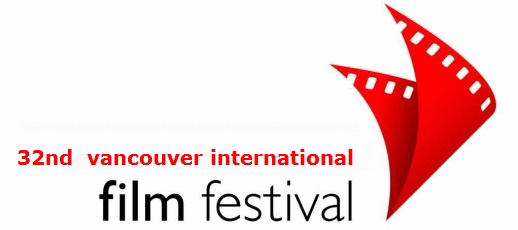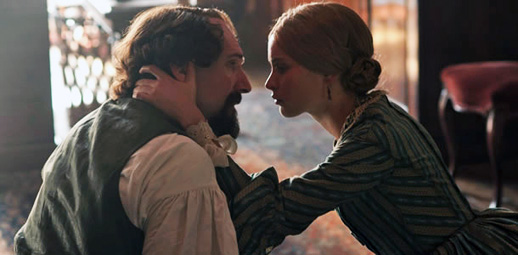
Well, the most august day in VanRamblings’ calendar year has finally arrived — the official commencement of Vancouver’s annual international film festival, offering each and every one of us a window on this vast, changing world of ours, and an affecting and often deeply moving insight into the lives of people who, just like us, across every country on Earth, have in common the struggle that defines us all, where collectively (whatever our circumstance) we seek social justice and peace, and a change in the economic conditions necessary to make this a fairer and more just world.
If you’re arriving to VanRamblings for the first time, you’ll want to apprise yourself of our extensive coverage of VIFF 2013 that was begun this Monday past. All of VanRamblings’ film festival postings may be found under the VIFF 2013 category to right (you’ll have to scroll down a bit). Thanks to some able assistance and much-appreciated direction from our friend Michael Klassen, we have for the first time this year a facility that will allow readers the opportunity to keep apprised of VanRamblings’ timely, and we hope informative, Twitter feed, replete with links of interest, and up-to-minute reflections on films we’ve just seen, as well as bumpf of one sort or another that readers may find of passing, or more, interest.
Before we settle down to providing you with Part 3 of our postings on VIFF 2013 “best bets”, those films which have garnered the most buzz at festivals from distant shores, we’ll provide you with VanRamblings’ VIFF 2013 programme schedule (pdf)
(well, at least the most recent edition, anyway), a partial list of the films that, at least at this point in time, we have every intention of taking in over the course of the next 16 days of the 32nd annual Vancouver International Film Festival. And, for your further enjoyment and edification, here’s the full VIFF MiniGuide Schedule (pdf).
Part 3, Films to Consider, VanRamblings’ “Best Bets” at VIFF 2013
The Playlist’s Oliver Lyttelton has this to say about Stray Dogs …
Every shot feels perfectly composed, the filmmaking almost impossibly well-realized, right down to the evocative sound design, adding up to an unforgettable experience, a film that demands a second viewing, there’s so much to unpack. In the end, you’re left with a masterclass in directing, and a film that anyone who’s serious about cinema needs to make the time to see.
In his five-star review, The Telegraph’s Robbie Collin is even more effusive in his praise for the film, writing …
In a small concrete room, with black mould climbing up its crumbling walls, a woman is watching two children sleep. She runs a brush through her hair, and the gentle scruff-scruff-scruff noise of the bristles mixes with the sound of falling rain. One of the children starts breathing heavily, in little half-sighs, half-snores, and as time passes, you realise that your own breath, and the breath of the audience, has synchronised with his. The mongrels of the title are a middle-aged father, and his young son and daughter, who during the day work as a ‘human billboards’, the children and he bedding down each night in a ruined tower block. By turns sad, bleakly funny and absolutely terrifying, every shot of Stray Dogs has been built with utter formal mastery, every sequence exerts an almost telepathic grip; the film, it seems at times, to have been beamed from another planet.
Viewers should be warned that this is Taiwanese master Tsai Ming-liang’s sumptuous brand of slow cinema, which perhaps means it is not for everyone. Tsai has long had the ability to create moments of great power from the seemingly most insignificant of events; in Stray Dogs, he reportedly outdoes himself, which, for VanRamblings, is all to the good.
Hotell: A couple of years ago, VanRamblings was absolutely blown away (we saw it four times at VIFF 2011) by Lisa Langseth’s début film, the thriller Pure, which also introduced the transportingly affecting Alicia Vikander (by far, the best thing about Joe Wright’s Anna Karenina this past Christmas), who holds the screen and the viewer’s attention like no other actress working today (although, one has to admit that Elle Fanning and Mia Wasikowska have their moments). And now Langseth and Vikander reunite, with Vikander starring in yet another, reportedly, astonishing performance, as a young mother suffering from severe postpartum depression.
Perhaps Hotell isn’t as strong a film as Pure (which is on our list of top 10 films of the millennium), but VanRamblings will attend a screening of Hotell for the sheer joy of experiencing the magic of Alicia Vikander on screen.
Tracks: One of the most acclaimed films at the Telluride, Venice and Toronto film festivals earlier this month, and starring the luminous and incandescent Mia Wasikowska, David Rooney, in The Hollywood Reporter, says of Tracks, “A journey of arduous physical challenges and incalculable spiritual rewards, Tracks is evocatively rendered in this superb adaptation of real-life adventurer Robyn Davidson’s epic journey across the Australian desert.” Says Robbie Collin in The Telegraph, who comments on Wasikowska’s “revelatory performance” …
In the wilderness, tracks are the things we follow, but also the things we leave behind: a trail of beaten earth that leads to the horizon in front of us; a line of footprints that tails off towards the one behind. John Curran’s achingly beautiful new film, which screened in competition at the Venice Film Festival, is about a woman who feels most alive in that place between starting point and destination. As such, she undertakes a journey that entails more betweenness than seems physically possible: a 1,700-mile solo trek across the Australian desert, on foot. A simple and beautiful journey undertaken purely for its own sake, and approached in that spirit, Tracks will lead you to a place of quiet wonder.
Kate Erbland, at Film School Rejects, weighs in with this: “Tracks is never anything less than intensely human and, quite often, deeply moving, the film a true unexpected pleasure.” Nuff said. We’ll be attending a screening.
Wadjda: Saudi Arabia’s first-ever Best Foreign Language Oscar entry, with over-the-moon reviews from a raft of estimable film critics, we’ll start of with Robbie Collins’ take in The Telegraph …
Like one of the great Italian neorealist films, Wadjda centres on a child and a bicycle. All Wadjda wants is a bike so she can race against the little boy who lives next door, but her mother (Reem Abdullah) refuses to buy her one: in Saudi Arabia, little girls do not ride bicycles. Modest as it may look, this is boundary-pushing cinema in all the best ways, and what a thrill it is to hear those boundaries creak.
The Guardian’s Xan Brooks says of this bittersweet film about a 10-year-old girl finding her feet in Riyadh society, “You’d need a heart of stone not to be won over by Wadjda, a rebel yell with a spoonful of sugar and a pungent sense of a Riyadh society split between the home, the madrasa and the shopping mall.” Most enthusiastic, though, is The Playlist’s Oliver Lyttelton who, while awarding the film an “A“, writes …
In a world where an independent-minded 14-year-old girl can be shot by the Taliban, Wadjda’s enormous warmth and comedy, and fine observational eye introduces a world alien to Western audiences, the film never sugarcoating the situation in Saudi Arabia, but by the end making it clear that in the likes of Wadjda, there are real hopes for progress and change in years to come. That it manages to do so in such a technically adept way (much of the production team are German), with such clarity of storytelling, and is able to do with humour, emotion and smarts, is something close to a miracle.
Well, that wraps up VanRamblings’ Day One post on the 32nd annual Vancouver International Film Festival — and our fourth consecutive VIFF 2013 post of the week. C’mon back tomorrow, and each of the 16 Festival days, for reviews, buzz, and more. For now, we’ll leave you with this …
- For those of you who did not catch our Monday introductory VIFF 2013 post, just click here.
- Parts 1 and 2 of our ‘best bets” posts may be found here and here.
- The search engine for VIFF 2013 films may be found here.
Enjoy your Festival, keep yourself hydrated, try to get some rest, c’mon back to VanRamblings for more Fest buzz each day, and over the course of the next 16 days, we’ll very much look forward to sharing a transcendently lovely VIFF screening with you in a warm, inviting and darkened cinema.

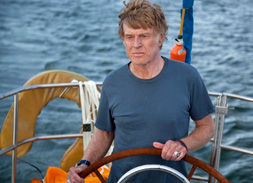
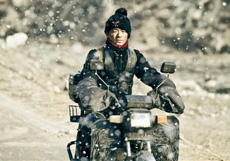 A Touch of Sin. Jia Zhangke’s bloody, bitter film finds the great Chinese filmmaker entering new genre territory, but retaining his commitment to the marginalized and oppressed — this time by way of four overlapping parallel stories, each inspired by real-life acts of violence. A miner (Jiang Wu) struggles with corrupt village leaders. A migrant worker (Wang Baoqiang), returning home, gets his hands on a firearm. A sauna hostess (Jia’s wife and muse, Zhao Tao) endures a series of humiliations over the course of an affair with a married man. A young man (Luo Lanshan) moves to a new town only to find himself trading one thankless, demoralizing job for another. The cumulative portrait, filled with despair and rage, is of a modern-day China undergoing rapid, convulsive changes and creeping cultural amnesia.
A Touch of Sin. Jia Zhangke’s bloody, bitter film finds the great Chinese filmmaker entering new genre territory, but retaining his commitment to the marginalized and oppressed — this time by way of four overlapping parallel stories, each inspired by real-life acts of violence. A miner (Jiang Wu) struggles with corrupt village leaders. A migrant worker (Wang Baoqiang), returning home, gets his hands on a firearm. A sauna hostess (Jia’s wife and muse, Zhao Tao) endures a series of humiliations over the course of an affair with a married man. A young man (Luo Lanshan) moves to a new town only to find himself trading one thankless, demoralizing job for another. The cumulative portrait, filled with despair and rage, is of a modern-day China undergoing rapid, convulsive changes and creeping cultural amnesia.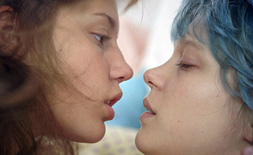 Blue is the Warmest Colour. Abdellatif Kechiche’s newest film, based on Julie Maroh’s graphic novel, was the sensation of this year’s Cannes Film Festival even before it was awarded the Palme d’Or. Adèle Exarchopoulos is Adèle, a young woman whose longings and ecstasies and losses are charted across a span of several years. Léa Seydoux (Midnight in Paris) is the older woman who excites her desire and becomes the love of her life. Kechiche’s movie is, like the films of John Cassavetes, an epic of emotional transformation. Blue pulses with gestures, embraces, furtive exchanges, and arias of joy and devastation, some verbal and some physical (including the film’s now celebrated sexual encounters between the two actresses).
Blue is the Warmest Colour. Abdellatif Kechiche’s newest film, based on Julie Maroh’s graphic novel, was the sensation of this year’s Cannes Film Festival even before it was awarded the Palme d’Or. Adèle Exarchopoulos is Adèle, a young woman whose longings and ecstasies and losses are charted across a span of several years. Léa Seydoux (Midnight in Paris) is the older woman who excites her desire and becomes the love of her life. Kechiche’s movie is, like the films of John Cassavetes, an epic of emotional transformation. Blue pulses with gestures, embraces, furtive exchanges, and arias of joy and devastation, some verbal and some physical (including the film’s now celebrated sexual encounters between the two actresses).

